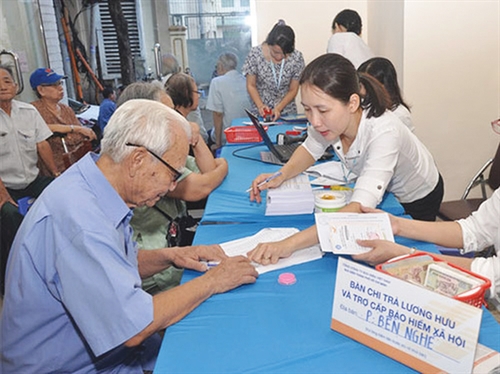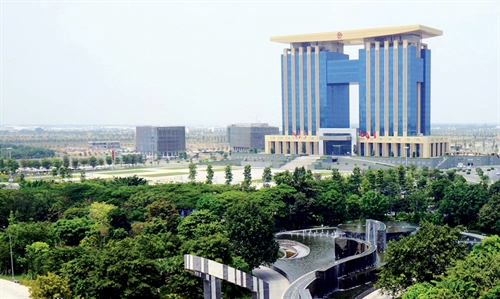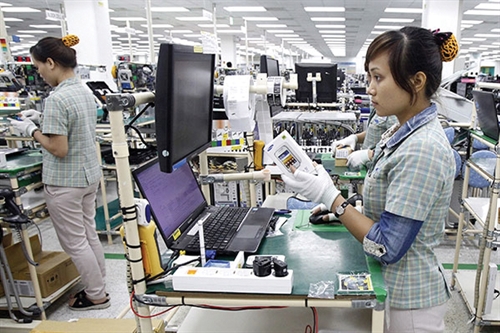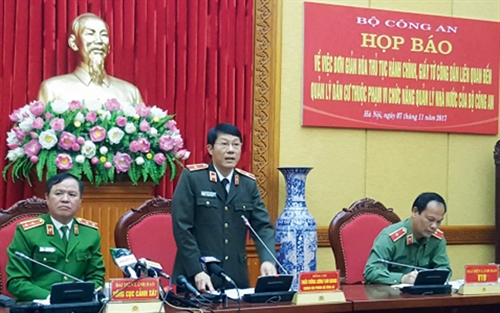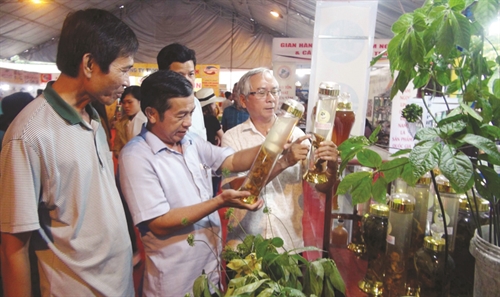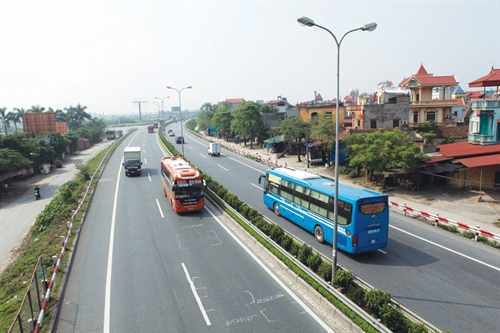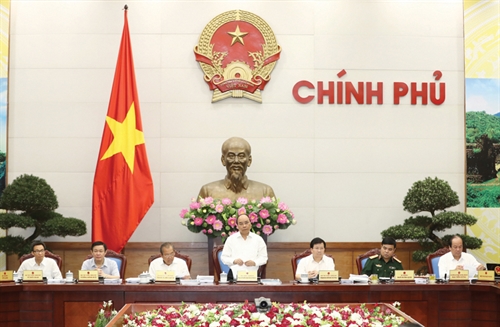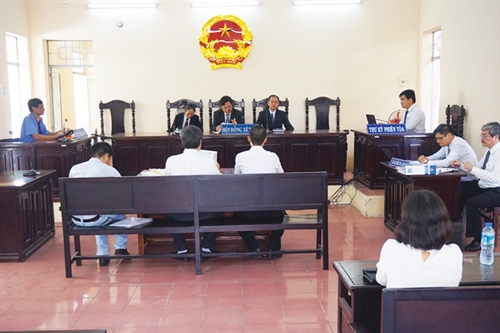The Binh Thuan province’s Public Security Department on June 18 decided to initiate criminal cases against acts of causing public disorder, destroying property and resisting on-duty persons occurring in Phan Ri Cua township of Tuy Phong district, Phan Ri Thanh commune of Bac Binh district, and Phan Thiet city early this month.
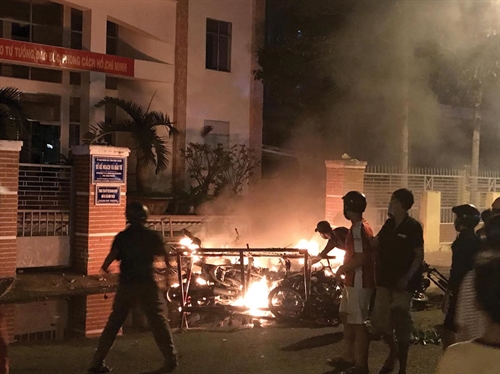 |
| Extremists cause disturbances in front of the office of Binh Thuan province’s Planning and Investment Department__Photo: Nguyen Thanh/VNA |
The disturbances happened on June 10-11 as a group of people rallied in front of the office of the People’s Committee of Binh Thuan province to protest the draft Law on Special Administrative-Economic Zones. The protest, however, quickly turned violent as protesters started vandalizing state office buildings, burning cars and clashing with on-duty officials, resulting in dozens of policemen being injured. Protesters also blocked a section of national highway 1, set cars on fire and threw rocks and petrol bombs at the police.
“The protest was likely planned in advance. Petrol, rocks and bricks were placed beforehand at places convenient for protesters to use against the competent forces,” Colonel Dao Trong Nghia, Deputy Director of Binh Thuan Public Security Department told the local newswire VnExpress.
The protest in Binh Thuan province was the most intense among a series of illegal gatherings in Ho Chi Minh City, Khanh Hoa, Da Nang and Hanoi against the draft Law on Special Administrative-Economic Zones.
Protesters claimed that they gathered to denounce a provision of the draft law that would allow foreign investors to lease land for up to 99 years in the three to-be-formed special administrative-economic zones of Van Don, Bac Van Phong and Phu Quoc.
However, it was seemingly not a convincing reason.
Pham Thi Thuy, aged 44, and Le Trong Nghia, aged 31, two workers of the Taiwan-invested Pouyuen Company prosecuted by the police of Binh Tan district in Ho Chi Minh City for resisting on-duty officers, confessed that they took the action following others without knowing the reasons.
On June 11, Thuy and Nghia joined an illegal gathering in front of their company to protest the draft Law on Special Administrative-Economic Zones, throwing rocks to on-duty mobile police. Nevertheless, they seemed unaware of their action.
“I didn’t know what special zones and the law on special zones mean. I just knew that special zones laid somewhere on islands. As I heard the crowd calling to throw rocks to protest special zones, I then joined in,” Nghia was quoted by the Phap luat Thanh pho Ho Chi Minh (Ho Chi Minh City Law) online as saying at the investigation agency.
Thuy, for her part, told investigators that she heard someone in the company asking to turn off power and go on demonstration. “Those who do not participate will be beaten,” Thuy said.
It is necessary to repeat that earlier on June 9, one day before the disturbances broke out, the Government and National Assembly Standing Committee announced that they decided to ask the National Assembly to delay the adoption of the draft Law on Special Administrative-Economic Zones so as to have more time for study and improvement. On June 12, the National Assembly officially postponed the vote on the draft law until its year-end session in October.
Hence, what was the real cause behind these street protests?
In a recent interview with VnExpress, Bui Van Cuong, President of the Vietnam General Confederation of Labor, said competent authorities had found leaflets invoking workers to take part in illegal gatherings.
On June 15, Binh Duong province’s police arrested Tran Minh Hue, aged 37, and Nguyen Dinh Thanh, aged 27, for printing and distributing documents calling for illegal demonstrations, VOV.vn reported.
Hue was caught red-handed while delivering leaflets calling industrial park workers to take off from work to participate in demonstrations in protest of lease of land in special administrative-economic zones. Meanwhile, Thanh was surprised in the act of photocopying more than 3,300 leaflets inciting protests against the draft Law on Special Administrative-Economic Zones.
The two men said they accessed websites of overseas anti-state groups and were seduced to call for illegal demonstrations with the aim of causing social disturbances.
Mechanisms for the public to voice their concerns
Obviously, those taking advantage of the situation to commit illegal acts, causing or inciting others to cause social disturbances, must be severely sanctioned. However, in the context that Vietnam has not yet issued a law on demonstration, what is the appropriate behavior for the public to voice their concerns about socio-political issues?
The President of the Vietnam General Confederation of Labor suggested three methods.
“The best way is to file petitions to competent authorities. The second is to meet and express ideas to responsible persons in localities and agencies. The third is to express opinions via feedback systems which are now available at all central and local agencies,” Cuong told the VnExpress newswire.
“Furthermore, workers should take the initiative in seeking complete information via official information channels of the Party and State,” he added.
“Responsible agencies are still working on the draft law on demonstration for submission to the National Assembly at an appropriate time. Pending the adoption of the law, we still have to abide by current regulations,” Cuong said.
But what is the suitable time for Vietnam to enact the law on demonstration?
For some legislators, the answer is “right now”.
Talking with the local press on the sidelines of the National Assembly’s session, deputy Truong Trong Nghia from Ho Chi Minh City said “it was “the right time to bring the draft law on demonstration back to the legislative agenda.”
“The formulation of a law on demonstration was prescribed in the Political Bureau’s Resolution 49 of 2005. This is the reason why the National Assembly should elaborate such law,” Nghia was quoted by the VietNamNet e-newspaper.
“I believe that the use of law to rule the society is a scientific and civilized method which conforms to the spirit of a law-governed state. The more complex and sensitive the problem, the greater the need to build a law to govern it,” Nghia commented.
Deputy Duong Trung Quoc from the southern province of Dong Nai shared Nghia’s opinion.
“Vietnam still lacks a legal framework to enable people to express their viewpoints in the form of demonstration, although it has been recognized in the Constitution for 70 years,” Quoc told local media at break time of a session of the National Assembly.
“I think we sorely need a law on demonstration,” he said, explaining that such a law would help people know how to express their views in a proper manner and provide state agencies with legal framework to handle extreme activities.
Meeting with voters in the Mekong Delta city of Can Tho on June 19, National Assembly Chairwoman Nguyen Thi Kim Ngan told that they can contribute their opinions to the Party, State and National Assembly in various forms and should not let them be incited by distorted information leading them to get involved in disturbing social order, sabotaging, and even committing legal violations like the incidents that have recently happened in some localities.
President Tran Dai Quang also mentioned the cases of social disturbance, property destruction and resistance to on-duty officers in several localities in a meeting with voters in Ho Chi Minh City on the same day. The President expressed his agreement with voters’ opinions on punishments imposed by authorized agencies.
He stressed the necessity to intensify dissemination of information to help the public understand more about the Party’s and State’s policies related to the draft Law on Special Administrative-Economic Zones so that they are not incited by evil-doers and opportunists, and do not conduct extreme acts as well as legal violations.- (VLLF)
